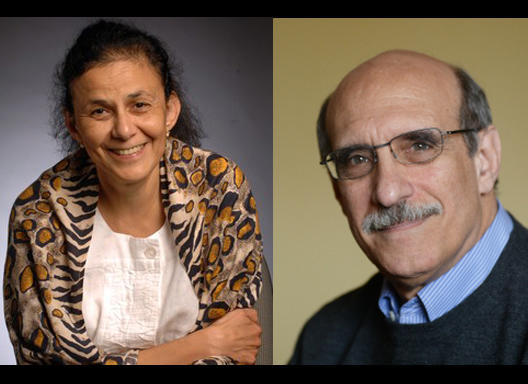Chalfie, El-Sadr earn top rank
Martin Chalfie, a chemistry professor who has developed novel biomarkers used in medical research, and Wafaa El-Sadr, an epidemiologist who has spent decades fighting HIV/AIDS in Africa, were recently named University Professors. The rank of University Professor is Columbia’s highest academic honor, with just thirteen members of the faculty now holding the title.
Chalfie won the Nobel Prize in Chemistry in 2008 for showing how a protein that is responsible for the luminescence of some jellyfish can be used in research. Scientists now use the protein, which is known simply as “green fluorescent protein,” for observing biological processes in model organisms.
El-Sadr has worked with hundreds of health-care facilities across sub-Saharan Africa to develop best practices for fighting infectious diseases such as HIV/AIDS and tuberculosis. Among her insights: patients are more likely to take their medications when family members are encouraged to keep tabs on their loved one’s adherence to a treatment regimen.
Hansen to lead new climate program
James Hansen, a renowned climate scientist and activist who until this past spring directed the NASA Goddard Institute for Space Studies, is creating a new policy-oriented climate program at Columbia’s Earth Institute. The mission of the Program on Climate Science, Awareness, and Solutions, he says, is to drive policy and market reforms “needed to preserve a habitable planet.”
According to Hansen, who is a longtime adjunct professor at Columbia, the program will support a broad range of climate research while also conveying to civic leaders and the media how its scientific results ought to inform policy decisions, such as those involving fossil-fuel emission targets.
Mailman adopts open-access policy
The Mailman School of Public Health has joined a growing movement among universities and research institutions to make scholarly research available for free. Earlier this year, the school’s faculty members decided that their papers should be posted in publicly available online repositories like Columbia’s Academic Commons or the National Institutes of Health’s PubMed Central.
Mailman is the first school at Columbia and one of the first public-health schools in the US to adopt an open-access resolution; Lamont-Doherty Earth Observatory became the first program at Columbia to adopt such a policy in early 2011, followed by Columbia Libraries later that year.



